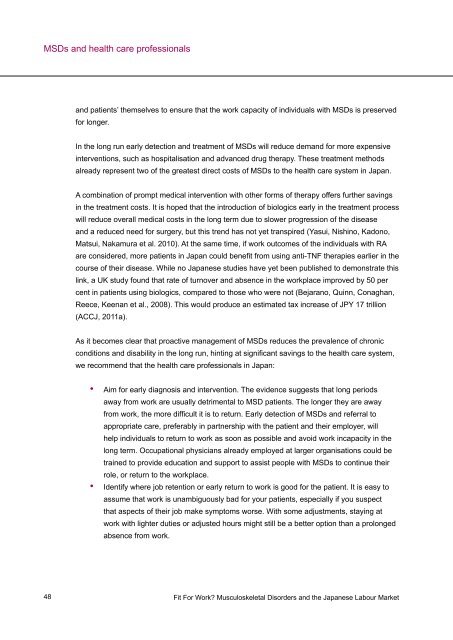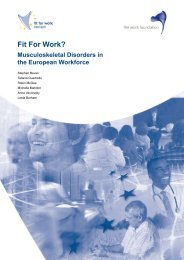English version - Fit for Work Europe
English version - Fit for Work Europe
English version - Fit for Work Europe
Create successful ePaper yourself
Turn your PDF publications into a flip-book with our unique Google optimized e-Paper software.
MSDs and health care professionals<br />
48<br />
and patients’ themselves to ensure that the work capacity of individuals with MSDs is preserved<br />
<strong>for</strong> longer.<br />
In the long run early detection and treatment of MSDs will reduce demand <strong>for</strong> more expensive<br />
interventions, such as hospitalisation and advanced drug therapy. These treatment methods<br />
already represent two of the greatest direct costs of MSDs to the health care system in Japan.<br />
A combination of prompt medical intervention with other <strong>for</strong>ms of therapy offers further savings<br />
in the treatment costs. It is hoped that the introduction of biologics early in the treatment process<br />
will reduce overall medical costs in the long term due to slower progression of the disease<br />
and a reduced need <strong>for</strong> surgery, but this trend has not yet transpired (Yasui, Nishino, Kadono,<br />
Matsui, Nakamura et al. 2010). At the same time, if work outcomes of the individuals with RA<br />
are considered, more patients in Japan could benefit from using anti-TNF therapies earlier in the<br />
course of their disease. While no Japanese studies have yet been published to demonstrate this<br />
link, a UK study found that rate of turnover and absence in the workplace improved by 50 per<br />
cent in patients using biologics, compared to those who were not (Bejarano, Quinn, Conaghan,<br />
Reece, Keenan et al., 2008). This would produce an estimated tax increase of JPY 17 trillion<br />
(ACCJ, 2011a).<br />
As it becomes clear that proactive management of MSDs reduces the prevalence of chronic<br />
conditions and disability in the long run, hinting at significant savings to the health care system,<br />
we recommend that the health care professionals in Japan:<br />
• Aim <strong>for</strong> early diagnosis and intervention. The evidence suggests that long periods<br />
away from work are usually detrimental to MSD patients. The longer they are away<br />
from work, the more difficult it is to return. Early detection of MSDs and referral to<br />
appropriate care, preferably in partnership with the patient and their employer, will<br />
help individuals to return to work as soon as possible and avoid work incapacity in the<br />
long term. Occupational physicians already employed at larger organisations could be<br />
trained to provide education and support to assist people with MSDs to continue their<br />
role, or return to the workplace.<br />
• Identify where job retention or early return to work is good <strong>for</strong> the patient. It is easy to<br />
assume that work is unambiguously bad <strong>for</strong> your patients, especially if you suspect<br />
that aspects of their job make symptoms worse. With some adjustments, staying at<br />
work with lighter duties or adjusted hours might still be a better option than a prolonged<br />
absence from work.<br />
<strong>Fit</strong> For <strong>Work</strong>? Musculoskeletal Disorders and the Japanese Labour Market







